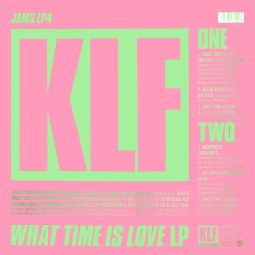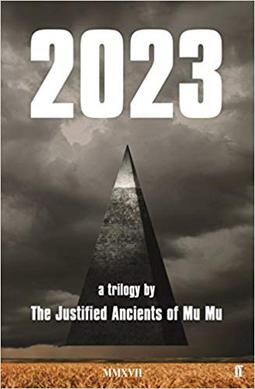
William Ernest Drummond is a Scottish artist, musician, writer, and record producer. He was a co-founder of the late-1980s avant-garde pop group the KLF and its 1990s media-manipulating successor, the K Foundation, with which he famously burned £1 million in 1994. More recent art activities, carried out under Drummond's banner of Penkiln Burn, include making and distributing cakes, soup, flowers, beds, and shoe-shines. More recent music projects include No Music Day and the international tour of a choir called The17. Drummond is the author of several books about art and music.
James Francis Cauty, also known as Rockman Rock, is an English artist and musician, best known as one-half of the duo The KLF, co-founder of The Orb and as the man who burnt £1 million.

The White Room is the fourth and final studio album by British electronic music group The KLF, released on 3 March 1991. The album features versions of the band's hit singles, including "What Time Is Love?", "3 a.m. Eternal", and "Last Train to Trancentral".
Ambient house is a downtempo subgenre of house music that first emerged in the late 1980s, combining elements of acid house and ambient music. The genre developed in chill-out rooms and specialist clubs as part of the UK's dance music scene. It was most prominently pioneered by the Orb and the KLF, along with artists such as Global Communication, Irresistible Force, Youth, and 808 State. The term was used vaguely, and eventually fell out of favor as more specific subgenres were recognized.

Chill Out is the third studio album by British electronic music group The KLF, released on 5 February 1990. It is an ambient-styled concept album featuring an extensive selection of samples, portraying a mythical night-time journey throughout the U.S. Gulf Coast states, beginning in Texas and ending in Louisiana. Chill Out was conceived as a continuous piece of music, with original KLF music interwoven with samples from songs by Elvis Presley, Fleetwood Mac, Acker Bilk, Van Halen, 808 State and field recordings of Tuvan throat singers.

"It's Grim Up North" is a song by The Justified Ancients of Mu Mu. The song was originally released as a limited edition "Club Mix" in December 1990 with Pete Wylie on vocals. A re-recorded version with Bill Drummond on vocals was released commercially in October 1991. These recordings were the first releases by Drummond and his creative partner Jimmy Cauty under the JAMs moniker since the 1988 compilation album Shag Times, and the last under that name; in the meantime they had operated as the Timelords and the KLF. The 1991 single release reached No. 10 on the UK Singles Chart and entered the top 10 in Denmark and Finland.

The Orb's Adventures Beyond the Ultraworld is the debut studio album by English electronic music group The Orb, released as a double album on 2 April 1991 by Big Life. It is a continuous, progressive composition evoking a two-hour psychedelic trip which draws from various genres and incorporates samples and sound effects. Much of the album was recorded after founding member Jimmy Cauty left the group, leaving Alex Paterson as the central member, with additional contributions by Andy Falconer, Kris Weston, and others.
This discography lists the key British and notable international releases of The KLF and the other pseudonyms of Bill Drummond and Jimmy Cauty. It also details the other releases on their independent record label, KLF Communications, by KLF-spinoff Disco 2000 and Space. In the United Kingdom—their home country—Drummond and Cauty released six albums and a wide array of 12 " singles on KLF Communications. In other territories their material was typically issued under licence by local labels.
Disco 2000 was a British pop band, a side project of The KLF. Vocals were handled by Cress, then-wife of KLF co-founder Jimmy Cauty, and "Mo". Between 1987 and 1989, Disco 2000 released three singles on the KLF Communications label, none of which entered the top 75 of the UK Singles Chart.

"Last Train to Trancentral" is a song released, in different mixes, as a series of singles by British electronic band The KLF, including "Last Train to Trancentral ". A commercially successful single of April 1991, it reached number two on the UK Singles Chart, number one on the UK Dance Singles Chart and achieved international top ten placings. It is a central song within The KLF's work, and is distinctive for an uplifting string-synthesiser break.

Shag Times is a UK compilation and remix double album released in 1989 by The Justified Ancients of Mu Mu. The album also introduced Bill Drummond and Jimmy Cauty's new incarnation – and one which would become considerably more famous – The KLF.

The "What Time Is Love?" Story is a compilation album by British electronic music duo The KLF, comprising six versions of their techno track "What Time Is Love?".

"Doctorin' the Tardis" is a novelty single by the Timelords. The song is predominantly a mash-up of the Doctor Who theme music and Gary Glitter's "Rock and Roll" with sections from "Block Buster!" by The Sweet. The single was not well received by critics but was a commercial success, hitting number one on the UK and New Zealand singles charts, and reaching the top 10 in Australia, Finland, Ireland and Norway.

"Whitney Joins the JAMs" is a song and 1987 single by the Justified Ancients of Mu Mu. The song, released on the JAMs' independent label KLF Communications, is built around plagiarised samples of Whitney Houston in which—thanks to studio technology—she "joins the JAMs".

"Kylie Said to Jason" was a 1989 single by The KLF, referring to Kylie Minogue and Jason Donovan, then stars in the popular Australian TV soap opera Neighbours. Designed for chart success, the single nonetheless failed to enter the UK top 100.

The KLF are a British electronic band formed in London in 1987. Bill Drummond and Jimmy Cauty began by releasing hip hop-inspired and sample-heavy records as the JAMs. As the Timelords, they recorded the British number-one single "Doctorin' the Tardis", and documented the process of making a hit record in a book The Manual . As the KLF, Drummond and Cauty pioneered stadium house and, with their 1990 LP Chill Out, the ambient house genre. The KLF released a series of international hits on their own KLF Communications record label and became the biggest selling singles act in the world in 1991.

"Fuck the Millennium", sometimes spelled "***k the Millennium", is a protest song by the band 2K—Bill Drummond and Jimmy Cauty—better known as the Justified Ancients of Mu Mu or the KLF. The song was inspired musically by Jeremy Deller's "Acid Brass" project, where a traditional brass band plays acid house classics; these include the KLF's "What Time Is Love?". They were also inspired topically by the then-forthcoming end of the second millennium and the plans to celebrate it.

The Orb are an English electronic music group founded in 1988 by Alex Paterson and Jimmy Cauty. Known for their psychedelic sound, the Orb developed a cult following among clubbers "coming down" from drug-induced highs. Their influential 1991 debut album The Orb's Adventures Beyond the Ultraworld pioneered the UK's nascent ambient house movement, while its UK chart-topping follow-up U.F.Orb represented the genre's commercial peak.

2023: A Trilogy is a book by Jimmy Cauty and Bill Drummond writing as The Justified Ancients of Mu Mu. The book was published in 2017, 23 years after the duo had burnt one million British pounds they earned in the music industry as The KLF.















